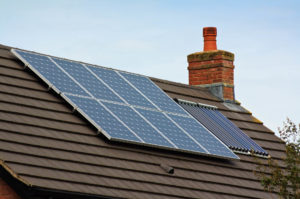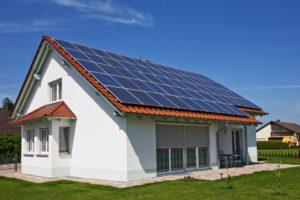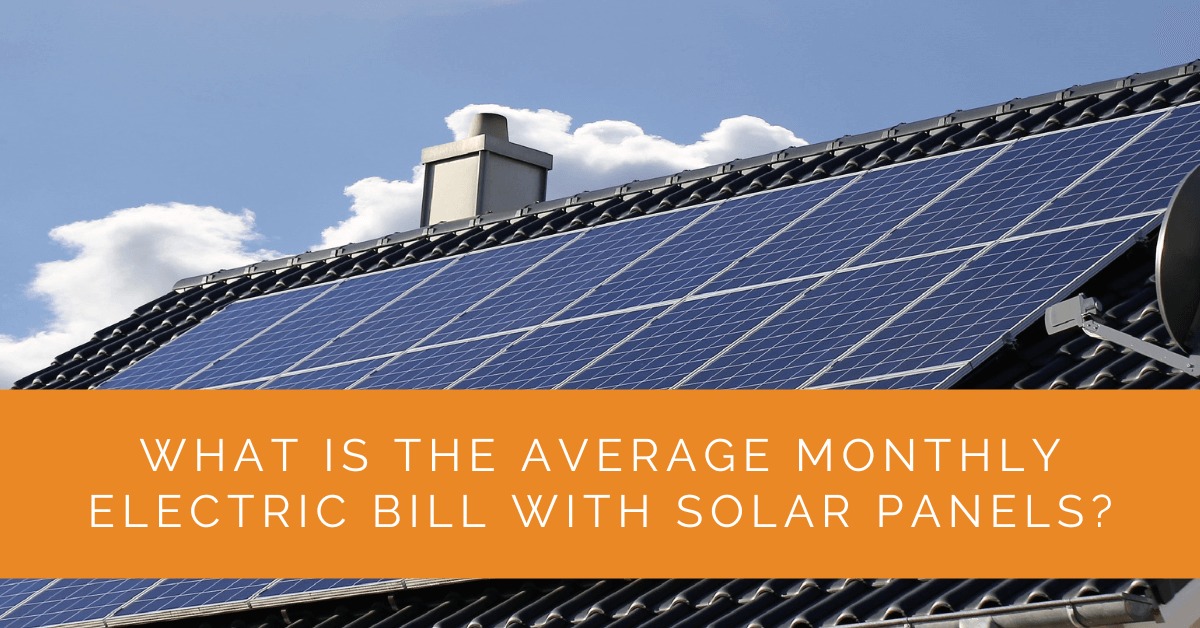Solar panels have become popular for many homeowners looking to save on their electric bills and contribute to a more sustainable future. But what does this mean for your monthly electric bill? Let’s delve into the details.
Contents
- 1 Key Takeaways
- 2 Understanding Solar Panels and Your Electric Bill
- 3 The Impact of Solar Panels on Your Electric Bill
- 4 The Average Monthly Electric Bill with Solar Panels
- 5 The Cost of Solar Panels and Potential Savings
- 6 How to Install Solar Panels for Maximum Savings
- 7 Case Study: Residential Solar Panel Installation
- 8 Expert Insights From Our Solar Panel Installers About What is the Average Monthly Electric Bill with Solar Panels
- 9 Experience Solar Excellence with Us!
- 10 Conclusion: Is Solar Right for You?
- 11 FAQ
Key Takeaways
- Solar panels can significantly reduce your monthly electric bill by generating electricity, reducing your reliance on the grid. The exact savings depend on the size of your solar system and your electricity usage.
- Installing solar panels can provide financial stability by locking in lower electricity costs for the system’s life, which is particularly beneficial as electricity rates continue to rise.
- A comparison of your electric bill before and after installing solar panels can illustrate the potential savings. For example, if your average monthly electric bill is $113 and drops to $20 after installing solar panels, you could save $93 or $1,116 annually.
Understanding Solar Panels and Your Electric Bill
How Solar Panels Save the Average Homeowner Money
Solar panels convert sunlight into electricity, which can be used to power your home. This means that instead of relying solely on the electricity supplied by your utility company, you can generate your solar energy. The more solar energy you produce, the less electricity you need to buy from the utility company, which can lead to significant savings on your electric bill.
Will You Still Have an Electric Bill After Installing Solar?
The answer to this question depends on several factors, including the size of your solar panel system, the amount of electricity your household uses, and the electricity rates in your area. Even with solar panels, most homes will still have an electric bill because they remain connected to the electric grid when their solar system isn’t producing enough electricity, such as at night or during periods of heavy cloud cover. However, the electric bill can be significantly lower than without solar panels.
The Impact of Solar Panels on Your Electric Bill
How Much Do Solar Panels Save on Electricity Bills?
The savings from solar panels can vary widely depending on your location, the size of your solar system, and your electricity usage. According to recent figures from the Energy Information Administration (EIA), the typical U.S. household uses approximately 10,766 kilowatt-hours (kWh) of electricity annually, with an average monthly usage of 897 kWh. Solar panels generate a significant portion of this electricity at home, reducing the amount you need to buy from the utility company.
What Will Your Monthly Electric Bill Be with Solar?
Your monthly electric bill with solar panels will depend on several factors, including the size of your solar system, the amount of electricity your household uses, and your local electricity rates. For example, if your solar panels generate 100% of your electricity needs, your electric bill could be significantly reduced. However, remember that most homes will still need to draw some electricity from the grid, especially at night or during periods of heavy cloud cover.

The Average Monthly Electric Bill with Solar Panels
How Much is the Average Monthly Electric Bill with Solar?
The average monthly electric bill with solar panels can vary widely depending on the abovementioned factors. However, many homeowners find their electric bill significantly lower after installing solar panels. For example, if your solar system covers 100% of your electricity needs, your electric bill could be reduced to the basic service fees charged by your utility company.
Comparing Your Electric Bill Before and After Installing Solar Panels
You can see the potential savings by comparing your electric bill before and after installing solar panels. Let’s say, for instance, your average monthly electric bill was $113. This figure is based on the Energy Information Administration (EIA) average of 899 kWh per month, with households paying 12.57¢ per kWh, resulting in an average American’s electric bill of approximately $113 per month. After installing solar panels, if your bill drops to $20, you would save $93 per month or $1,116 per year.
The Cost of Solar Panels and Potential Savings
Understanding the Average Cost of Solar Panels
The cost of solar panels has dropped significantly in recent years, making them more affordable for many homeowners. The average solar panel system cost can vary depending on the system size, your location, and the installer you choose. However, the net cost can be much lower when you factor in the savings on your electric bill, the federal solar tax credit, and other local incentives.
How Installing Solar Panels Can Lower Your Electric Bill
Installing solar panels can lower your electric bill by reducing the amount of electricity you need to buy from your utility company. Solar panels generate electricity you can use in your home, reducing your reliance on the grid. The savings will depend on your solar system’s size and electricity usage. Still, many homeowners find their electric bills significantly lower after installing solar panels.

How to Install Solar Panels for Maximum Savings
The Process to Install Solar Panels
Installing solar panels involves several steps, including initial consultation, site assessment, system design, installation, and system activation. A professional solar installer can guide you through the process and ensure your system is installed correctly for maximum energy production.
How Solar Panels Save You Money on Your Electric Bill
Solar panels save you money on your electric bill by generating your electricity. The more electricity your solar panels produce, the less you need to buy from your utility company. Additionally, suppose your solar system produces more electricity than you use. In that case, the excess electricity can be sent back to the grid, and you may receive a credit from your utility company, further reducing your electric bill.
Case Study: Residential Solar Panel Installation
Background
In an effort to reduce electricity bills and contribute to environmental sustainability, a homeowner in Texas approached Solar Panels Network USA to install a residential solar panel system. The homeowner aimed to harness the abundant Texas sunlight to generate clean, renewable energy and lower their monthly electric bill.
Project Overview
The homeowner’s primary goal was to achieve significant savings on their electric bill while also reducing their carbon footprint. The key objectives included:
- Assessing the home’s energy consumption patterns.
- Designing a solar panel system tailored to meet the household’s electricity needs.
- Ensuring the system was cost-effective and eligible for local incentives.
Implementation
Site Assessment and System Design
Our team conducted a comprehensive site assessment, evaluating the roof’s condition, orientation, and potential shading issues. The house had an ideal south-facing roof with minimal shading, making it perfect for solar panel installation. We designed a 6 kW solar panel system, which included:
- High-efficiency photovoltaic panels.
- A string inverter to convert DC to AC electricity.
- Monitoring equipment to track the system’s performance.
Installation Process
- Material Collection: All necessary materials, including panels, mounting hardware, and electrical components, were gathered.
- Roof Preparation: Stanchions were installed on the roof rafters to provide a sturdy base for the panels.
- Flashing Installation: Flashing was added to prevent water ingress and ensure the roof’s integrity.
- Rail Attachment: Rails were securely fastened to the stanchions, creating a framework for the panels.
- Panel Mounting: The solar panels were mounted onto the rails and connected to the inverter.
- Wiring: Electrical wiring was run from the panels to the inverter and then to the home’s electrical panel.
- System Activation: After a thorough inspection, the system was activated and began generating electricity.
Results
Energy Savings
The installed solar panel system generated approximately 800 kWh of electricity per month, covering the majority of the household’s energy needs. Before the installation, the homeowner’s average monthly electric bill was $120. After installing the solar panels, the bill was reduced to approximately $25, covering the basic service fees and occasional grid electricity use. This resulted in a monthly saving of $95, translating to an annual saving of $1,140.
Environmental Impact
The solar panel system reduced the household’s reliance on fossil fuels, contributing to a decrease in carbon emissions. The homeowner was able to offset nearly 7,200 pounds of CO2 annually, equivalent to planting about 54 trees each year.
Financial Incentives
The project was eligible for federal tax credits and local incentives, which reduced the overall cost of the system. The homeowner took advantage of the federal solar tax credit, which covered 26% of the installation cost, and local rebates provided by the state of Texas.
Summary
This case study demonstrates the significant financial and environmental benefits of installing solar panels. The homeowner in Texas achieved substantial savings on their electric bill while contributing to a cleaner environment. At Solar Panels Network USA, we are committed to helping homeowners realize the potential of solar energy through tailored solutions and professional installation services.
Expert Insights From Our Solar Panel Installers About What is the Average Monthly Electric Bill with Solar Panels
Understanding your household’s electricity usage is crucial before installing solar panels. It helps in designing a system that meets your energy needs efficiently.
Senior Solar Panel Installer
Solar panels can drastically reduce your electricity bills, but it’s important to remember that most homes will still have a small bill due to grid connection fees and occasional energy draw from the grid.
Lead Solar Engineer
Maximizing your savings with solar panels involves not just installation but also ensuring your system is optimized for your location’s sunlight exposure and your home’s energy consumption patterns.
Chief Installation Officer
Experience Solar Excellence with Us!
Trust in Solar Panels Network USA, where our seasoned experts deliver top-quality solar solutions for homes and businesses nationwide. With a legacy of countless successful installations and a commitment to sustainable energy, we’re your reliable partner in the solar journey. Ready for a brighter, eco-friendly future? Call us now at (855) 427-0058 and harness the power of the sun!
Conclusion: Is Solar Right for You?
Evaluating if Solar Panels Can Save on Electric Bills for Your Home
Solar panels can save on electric bills for many homeowners. Still, the savings will depend on several factors, including the size of your solar system, your electricity usage, and your local electricity rates. A professional solar installer can provide a detailed estimate of the potential savings based on your circumstances.
The Future of Your Electric Bill with Solar Panels
With solar panels, the future of your electric bill could be much brighter. As electricity rates continue to rise, the savings from solar panels could increase. Additionally, with a solar system, you can lock in lower electricity costs for the life of your system, providing financial stability and peace of mind.
FAQ
Do you really save money with solar panels?
Yes, you can save money with solar panels. By generating your electricity, you reduce the amount you need to buy from your utility company, which can lower your electric bill. The savings will depend on your solar system’s size and electricity usage.
How much electricity does a solar panel produce per month?
The amount of electricity a solar panel produces per month depends on several factors, including the panel size, the amount of sunlight it receives, and the panel’s efficiency. A 5 kW solar panel installation will produce about 667-kilowatt hours a month.
How much money do you actually save from solar panels?
The amount of money you save from solar panels can vary widely depending on your location, the size of your solar system, and your electricity usage. However, many homeowners find their electric bills significantly lower after installing solar panels. For example, if your solar system covers 100% of your electricity needs, your electric bill could be reduced to the basic service fees charged by your utility company.
Can you run your whole house on solar power?
Yes, running your whole house on solar power is possible, especially if you have a large enough solar system and a battery storage system to store excess electricity for use when the sun isn’t shining. However, most homes will still be connected to the grid when the solar system isn’t producing enough electricity, such as at night or during periods of heavy cloud cover.
About the Author
Solar Panels Network USA stands at the forefront of solar energy solutions, driven by a team of seasoned solar engineers and energy consultants. With over decades of experience in delivering high-quality solar installations and maintenance, we are committed to promoting sustainable energy through customer-centric, tailored solutions. Our articles reflect this commitment, crafted collaboratively by experts to provide accurate, up-to-date insights into solar technology, ensuring our readers are well-informed and empowered in their solar energy decisions.

